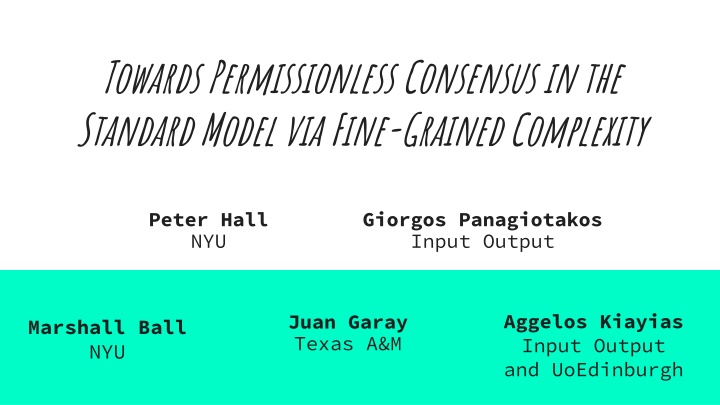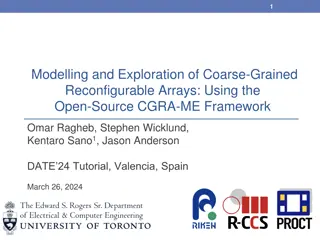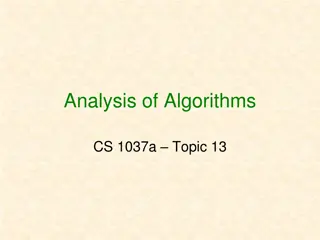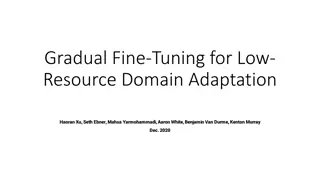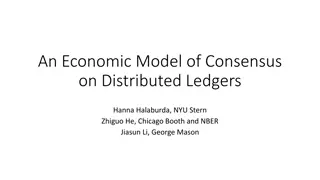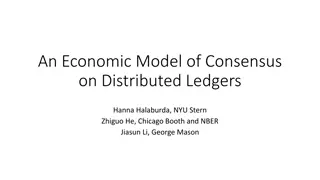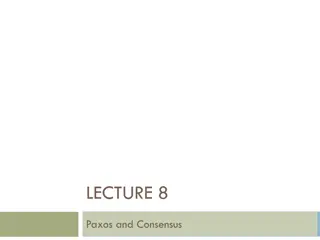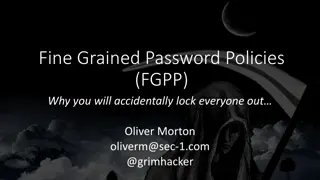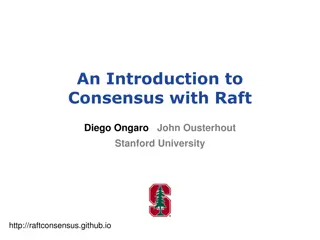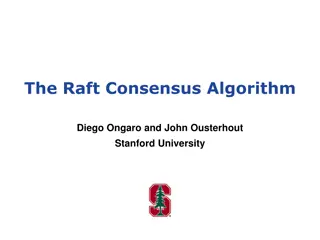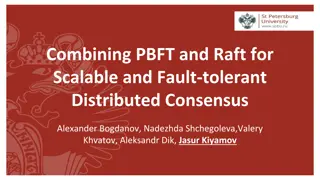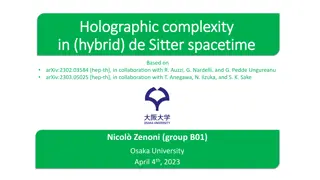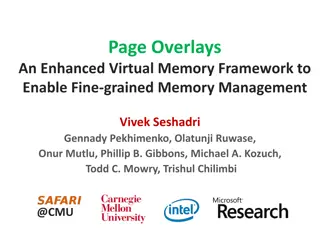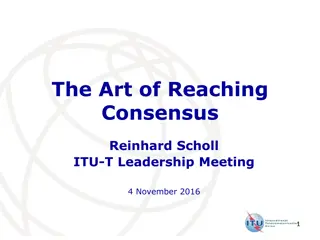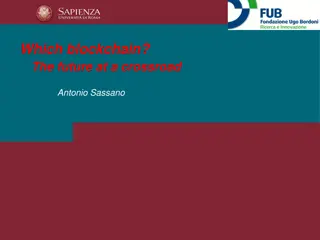Towards Permissionless Consensus: Fine-Grained Complexity
This content delves into achieving permissionless consensus in the standard model through fine-grained complexity. It discusses the consensus and limits of permissionless systems, including aspects like agreement, validity, and the implications of Sybil attacks. The role of Proof of Work mechanisms, randomness beacons, and explicit hard problems in ensuring security is highlighted. Additionally, it explores fine-grained assumptions in tackling problems where brute force is relatively easy but necessitates advanced solutions.
Download Presentation

Please find below an Image/Link to download the presentation.
The content on the website is provided AS IS for your information and personal use only. It may not be sold, licensed, or shared on other websites without obtaining consent from the author.If you encounter any issues during the download, it is possible that the publisher has removed the file from their server.
You are allowed to download the files provided on this website for personal or commercial use, subject to the condition that they are used lawfully. All files are the property of their respective owners.
The content on the website is provided AS IS for your information and personal use only. It may not be sold, licensed, or shared on other websites without obtaining consent from the author.
E N D
Presentation Transcript
Towards Permissionless Consensus in the Standard Model via Fine-Grained Complexity Peter Hall NYU Giorgos Panagiotakos Input Output Aggelos Kiayias Input Output and UoEdinburgh Juan Garay Texas A&M Marshall Ball NYU
Consensus and Limits of Permissionless Agreement all honest parties output b Validity all parties have same input b is specific f n of input
Consensus and Limits of Permissionless (Sybil Attack)
PoWs and The Random Oracle Bitcoin protocol (and many others) use Random Oracles
PoWs and The Random Oracle Bitcoin protocol (and many others) use Random Oracles Only Heuristically Secure!!
What we Want Explicit Hard Problem
What we Want Explicit Hard Problem Fine-Grained Complexity (Cf. [Wil18])
What We Do Fine-Grained Hardness V U + Randomness Beacon (Only Crypto used, necessary for small beacon) + (subexp) DDH Permissionless Consensus
Fine-Grained Assumptions We consider problems for which brute force is ``easy but is essentially state of the art
Fine-Grained Assumptions We consider problems for which brute force is ``easy but is essentially state of the art This talk: O(n2)
Fine-Grained Assumptions We consider problems for which brute force is ``easy but is essentially state of the art This talk: O(n2) This talk: O(n2- )
Fine-Grained Assumptions We consider problems for which brute force is ``easy but is essentially state of the art Orthogonal Vectors: Given n sets of d-long vectors U, V, is there u U, v V such that <u,v> = 0?
Fine-Grained Assumptions We consider problems for which brute force is ``easy but is essentially state of the art Orthogonal Vectors: Given n sets of d-long vectors U, V, is there u U, v V such that <u,v> = 0? 1001 ... 01 U V 1001 ... 01 < , > = 0 0100 ... 10 0100 ... 10
Fine-Grained Assumptions Orthogonal Vectors: Given n sets of d-long vectors U, V, is there u U, v V such that <u,v> = 0? Orthogonal Vectors Conjecture [Wil05]: for d= (log n), for all >0, OV cannot be solved in O(n2- ). 1001 ... 01 U V 1001 ... 01 < , > = 0 0100 ... 10 0100 ... 10
Fine-Grained Assumptions k Orthogonal Vectors: Given n sets of d-long vectors U1, U2,...Ukis there u1 U1, u2 U2,... uk Uk such that u1,iu2,i uk,i= 0? k-Orthogonal Vectors Conjecture: for d= (log n), for all >0, kOV cannot be solved in O(nk- ). 1001 ... 01 U1 U2 1001 ... 01 Uk . . . 1001 ... 01
KSaT and SETH KSAT: Does there exist an assignment to x1,...,xn such that this outputs 1? . . . Strong Exponential Time Hypothesis (SETH)[IP01]: , k s.t. kSAT cannot be solved in time O(2(1- )n) x1 x3 x20 xn xn x3 x2 x1 x4 k fan-in
Fine-Grained Assumptions Orthogonal Vectors: Given n sets of d-long vectors U, V, is there u U, v V such that <u,v> = 0? Orthogonal Vectors Conjecture: for d= (log n), for all >0, OV cannot be solved in O(n2- ). 1001 ... 01 U V 1001 ... 01 < , > = 0 0100 ... 10 0100 ... 10
Fine-Grained Assumptions Orthogonal Vectors: Given n sets of d-long vectors U, V, is there u U, v V such that <u,v> = 0? Orthogonal Vectors Conjecture: for d= (log n), for all >0, OV cannot be solved in O(n2- ). 1001 ... 01 U V SETH => 2OV, kOV conjectures 1001 ... 01 < , > = 0 0100 ... 10 0100 ... 10
T-PoWs [BRSV18] c $ Prover Verifier 1. Completeness: P convinces V in T steps
T-PoWs [BRSV18] c $ Prover Verifier 1. Completeness: P convinces V in T steps 1. Security: Convincing P must run in ~T steps
T-PoWs [BRSV18] c $ Prover Verifier 1. Completeness: P convinces V in T steps 1. Security: Convincing P must run in ~T steps 1. Efficiency: V runs in << T steps
T-PoWs [BRSV18] c $ Prover Verifier 1. Completeness: P convinces V in T steps 1. Security: Convincing P must run in ~T steps Concrete Prover- Verifier Gap 1. Efficiency: V runs in << T steps
Non-Amortizing Prover Verifier c1, c2,...cm $ 1 2 . . . m
Non-Amortizing Prover Verifier c1, c2,...cm $ 1 2 . . . 2. Non-amortizing security: convincing V of m independent statements takes mT1- time
Limit of previous non-amortizing Consider following malicious P: Prover Verifier c1 $ 1 Cheating Strategy I can cheat on c1
Limit of previous non-amortizing Consider following malicious P: Prover Verifier c2 $ 2 Cheating Strategy I can cheat on c2
Limit of previous non-amortizing Consider following malicious P: Prover Verifier ci $ Oops, never got it! Cheating Strategy I can t cheat on ci!
Limit of Non-Amortizing 2. Non-amortizing security: convincing V of m independent statements takes mT1- time Says nothing about convincing on l of the m challenges
Protocol-Friendly PoW Prover Verifier c1, c2,...cm $ 1 2 . . . 2. Robust non-amortizing security: Given m independent statements convincing V of any l m takes lT1- time
Robust Fine-Grained Security 2. Robust non-amortizing security: Given m independent statements convincing V of any l m takes lT1- time
Robust Fine-Grained Security 2. Robust non-amortizing security: Given m independent statements convincing V of any l m takes lT1- time Robust Direct Sum Theorem (informal): Assuming OV takes time n2-o(1)in the worst case, there is a O(n2) time problem where completing any l of m instances takes l n2-o(1)time
Upshot Conjectured algorithmic barriers for natural, useful problems Robust PoW
Upshot Conjectured algorithmic barriers for natural, useful problems Robust PoW Win-Win: Either we have a PoW, or we break SETH (yielding new algorithmic techniques)
Upshot Conjectured algorithmic barriers for natural, useful problems Permissionless Consensus (in the Beacon Model) Robust PoW Win-Win: Either we have consensus, or we break SETH (yielding new algorithmic techniques)
Seeded PoWs Prover Verifier c1, c2,...cm $ 1 2 . . . m
Seeded PoWs Prover Verifier c1, c2,...cm $ 1 2 . . . m
Seeded PoWs Prover Verifier c1, c2,...cm $ 1 m proofs takes m fresh pieces of randomness 2 . . . m
Seeded PoWs Prover Verifier seed $ 1 seed seed 2 expand expand c1 c1 . . . c2 . . . c2 . . . m
Zero-Knowledge PoW Using DDH, can hide proof in the exponent (and even extract by hiding bit-by-bit) Only Crypto used! Using CIH from sub-exp DDH [JJ21], we can then make this non-interactive
permissionless consensus
model Setup: Randomness Beacon Msg diffusion functionality[AD15],[GKL15] - Models gossiping + no identities - Synchronous - Honest messages arrive within a round - (Rushing) adversary Fixed number of steps per round V U
Resource-bounded adversary (adversarial power) < (total honest power)/ or t < (n-t) / : some constant > 0 #corrupted parties : security parameter #parties t: n:
improved pow security Improved PoW security[BRSV18]: l-out-of-m hard, NIZK-PoW Directly using known consensus protocols not possible Problem #1: PoW hard with non-negligible error Problem #2: Cannot bind messages (cf. H(msg, ctr)<T)
Usual approach in (permissioned) consensus [Lamport 83, Feldman-Micalli 97, ] Weak Graded Consensus Full Consensus Consensus y P:outP {y, } P:outP=(y,1) P :outP =(y,0 1) y P: outP=y security based on counting votes sybil attack
x1| x2| x3| | xm/2| xm/2+1| | xm PoWs interpretation 0 | 0 | | 0 |0 | 1 | 1 | | 1 vote (b, i, yi) Weak i [m/2] yi:=PoW(xi) Diffusion Network Consensus P(0) (( bj, j, yj))j resend consistent view Output b , if majority agrees (from round 1) Else
validity with non-negl error x1| x2| x3| | xm/2| xm/2+1| | xm 0 | 0 | | 0 |0 | 1 | 1 | | 1 (b, i, yi) Weak i [m/2] yi:=PoW(xi) Diffusion Network Consensus P(0) (( bj, j, yj))j resend weak agreement unconditionally Output b , if majority agrees (from round 1) Else
error reduction Weak Consensus y1 WCnn y2 WCnn 0, y >2l/ y3 3 0s 1, WCnn >2l/ yl 3 1s , else WCnn l~log2( )
